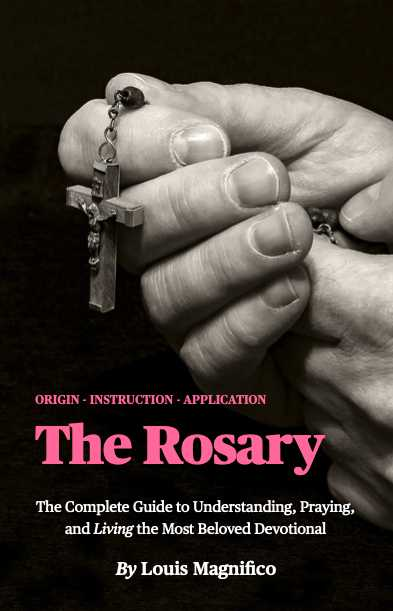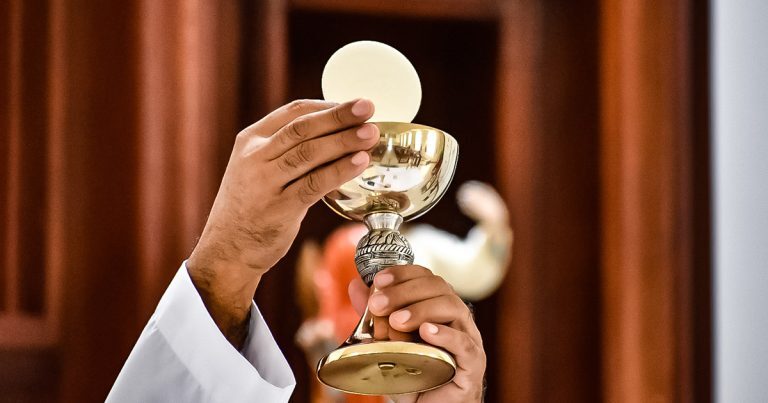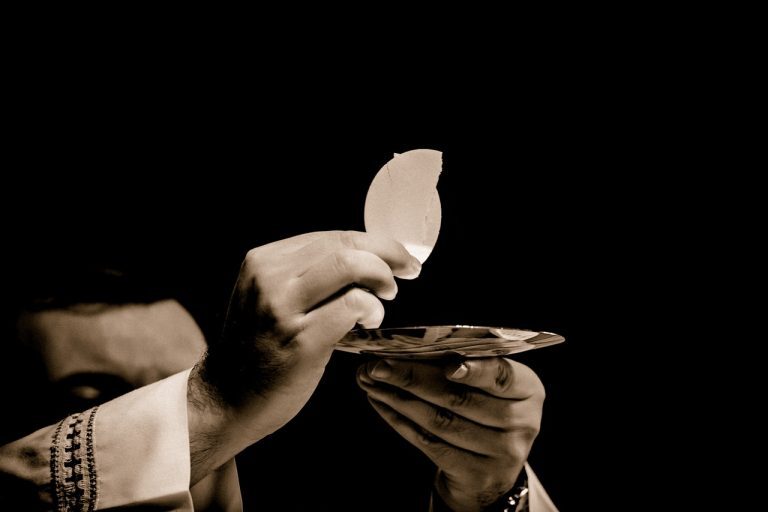When Catholics explain our faith in the Real Presence – Christ’s body, blood, soul, and divinity in the Eucharist – it’s common to point to John 6 and examine the “Bread of Life” discourse from Jesus. While this is indeed the longest – and arguably the most clear – teaching of this doctrine in the Bible, there are other passages and expository teachings that are equally convincing.
I personally enjoy, for example, taking a deep dive into the Old Testament, understanding the nature of God’s covenant relationship to His people, and seeing how the Eucharist is the fulfillment of eating the Passover Lamb. A study in the Old Testament demonstrates how the Eucharist relates to manna and the Bread of the Presence. It’s a study that leads you through the vast majority of Israel’s history and concludes with the “new and eternal covenant” in the Blood of Christ that fulfills the Old Covenants that God made. It’s not a short undertaking but by the end of the study, not only will you understand the Eucharist… but you’ll also know Bible history to a much greater understanding!
But there’s another passage that more easily – and certainly more concisely – explains the doctrine of the Real Presence. It’s in 1 Corinthians chapter 11. Before we dig into this passage, let’s briefly recall what Jesus taught in the Bread of Life discourse mentioned above – the passage most often alluded to when discussing the Eucharist.
In John 6, Jesus has just fed the 5,000 by multiplying the five loaves of bread and two fish before setting out to Capernaum. Many of those who were miraculously fed followed Jesus. Upon their finding Him in the synagogue, Jesus told them that they were seeking him not because they saw signs… but rather because they had eaten their fill of food. He told them, “Do not labor for the food which perishes, but for the food which endures to eternal life, which the Son of Man will give to you.” (John 6:27, RSV-2CE)
After Jesus spoke about this bread from heaven a little more, stating that it comes from the Father and gives life to the world, they pleaded with Jesus, “Lord, give us this bread always.” This is when Jesus tells them, “I am the Bread of Life” and states that He came down from Heaven – a clear claim of His divinity!
The disciples murmured at this statement which they considered blasphemous. Here was Jesus, a man whom they knew, claiming divinity for Himself! Jesus then takes it one step further. Already having called Himself the “Bread of Life,” He then explains more – alluding to the manna that the Jews ate in the time of the Exodus – and finally stating that the bread that gives life is His very flesh, which will be given for them.
The followers murmur even more at this claim. How could He give them His flesh to eat, they ask. Rather than explaining that it’s some kind of metaphor or symbol, Jesus goes all in on His remarkable claim. He tells them that unless they eat His flesh and drink His blood, they will not have life… but if they do eat His flesh and drink His blood, then He will raise them up at the last day. After making this claim, he reiterates it… and this time tells them that if they eat and drink His flesh and blood, then He will abide in them and they will live forever.
Notice that Jesus added the drinking of His blood along with the eating of His flesh. To a Jew, this was a forbidden practice. Also notice that Jesus claims to be able to offer eternal life to those who eat and drink of Him. Furthermore, He claims to be the One who will raise the dead at the last day. These are more claims of Christ’s divinity.
One other item to mention: the word for “to eat” that is used here is, in Greek, “trogo.” It literally means to gnaw and chew on. In Greek literature, you find this word used in reference to animals chewing food. It gives a crude connotation and is a different Greek word from other times the word “eat” is used. In these other cases, the Greek word “esthio” is used. “Esthio” implies eating in a more “general activity” sense. As in, “what will we eat today for breakfast?” “Trogo” doesn’t seem to be a word you’d use if you were expressing symbolic eating. It conveys the physical sense of chewing flesh.
The disciples were outraged and dismayed at hearing this teaching but Jesus held his ground. And that’s when we read that many of His disciples left and no longer followed Him. Jesus didn’t try to stop them. He didn’t send Peter after them to tell them it was all hyperbolic language and symbolism. He let them go. And then, you can almost feel God’s emotion in the Biblical narrative as Christ turns to his Twelve Apostles and says to them, “Will you also go away?”
Peter answers Christ in the most truthful and simple way possible: “To whom shall we go? You have the words of eternal life; and we have believed, and have come to know, that you are the Holy One of God.”
We aren’t given evidence that Peter understood the teaching. We aren’t lead to believe that Peter, in contrast to the departing disciples, thought any of this was any an “easy teaching.” We are only shown that Peter had faith. He believed Jesus was the Christ and he took Jesus at His word.
We read about this in John 6 and later, at the Last Supper and the ensuing Passion of Christ, we see it all come together as Christ institutes the Eucharist, fulfills the Passover, and ushers in the New and Eternal Covenant: the fulfillment of all of the Old Covenants. (For a great summary of this theology, I highly recommend two books… Bible Basics for Catholics by John Bergsma and The Fourth Cup by Scott Hahn). But later, in 1 Corinthians 11, the Apostle Paul provides an equally convincing passage to teach the Real Presence of Christ in the Eucharist.
Paul writes to the church in Corinth that Jesus Himself revealed to him how He instituted the Eucharist (1 Cor 11:23). Paul tells the Corinthians how Jesus, at the Last Supper, took the bread, broke it, and said, “This is my body which is for you.” Likewise, He took the chalice and said, “This chalice is the new covenant in my blood.” Then Paul explains that, in light of this, anyone who eats the bread or drinks the cup of the Lord in an unworthy manner is guilty of “profaning the body and blood of the Lord” (1 Cor 11:27, RSV-2CE). He instructs the Christians to perform an examination of conscience before partaking of the Eucharist to determine if he/she is worthy to receive the Sacrament. Furthermore, Paul plainly states in verse 29, “For any one who eats and drinks without discerning the body eats and drinks judgement upon himself.” He goes on to say that many are weak, ill, or have died because they did not discern the body before partaking.
Let’s examine the seriousness with which Paul addresses the subject. Paul advises the Church not to profane the body and blood of the Lord by taking Him into ourselves while we are unworthy to receive Him. If it were all just a symbol, why would it matter so significantly? But if it is indeed the real body and blood of our Lord, then we certainly can understand Paul’s instruction. We Catholics believe that Mary herself was redeemed by Christ “in advance” so that Christ was placed in Mary’s womb as a pure, holy, and sinless tabernacle. Simply put, God does not go into something unclean.
Just look at all the warnings Paul gives:
- He advises the Church members to give themselves an examination of conscious prior to receiving the Eucharist
- He cautions the Church members about potentially profaning the body and blood of Christ if they were to receive Him unworthily
- He tells them that is they don’t discern the body of Christ when they behold the Eucharist, then they eat and drink judgement upon themselves
- He even says that many are weak, ill, or have died because they didn’t discern the body of Christ when they partook in the Eucharist.
Clearly, this is not a light subject for the Apostle Paul. And he’s certainly not saying, “You better be worthy before you dare to remember me.” That would make no sense! He’s not saying, “You better do an examination of conscious before you ever dare to remember me.” Rather, he’s cautioning us to make sure we are not in a state of mortal sin and to ensure that we recognize the body and blood of Christ in the Eucharist before partaking.
In light of the context – and in light of the literal reading of the passage – Paul is telling us that Jesus Himself received this teaching of the Real Presence in the Eucharist straight from the Lord Jesus (perhaps in a vision). This teaching matches that which Christ previously taught the Apostles and his disciples, as recorded in John 6.

















